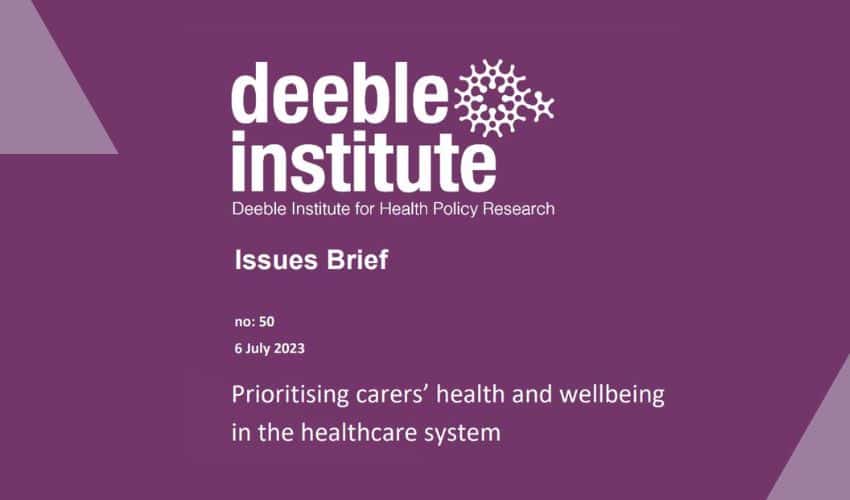Deeble Institute for Health Policy Research brief: Prioritising carers’ health and wellbeing in the healthcare system highlights gaps in care for community carers & discusses limitations in data collected & how clinicians conduct assessments
Key Messages
- Approximately 13% of Australians provide unpaid care to family members or friends living with chronic illness or disability and have no formal healthcare training. In 2020 carers saved the government $77.9 billion in healthcare expenditure. Carers experience negative impacts on their physical, mental, social and financial status as a result of their caring role. There is limited support for carers in our community resulting in poor health and wellbeing outcomes for carers.
- Minimal data are available to provide a clear picture of carer demographics, and how their needs can best be met. Frameworks to assess carers’ needs exist, however these are not nationally implemented resulting in inconsistencies in the amount and type of resources recommended and inequalities in the delivery of health care. The development and implementation of a national standardised framework will assist in identifying carers and their needs and will be critical to facilitate appropriate allocation of resources.
- No standards exist related to carers’ own health and wellbeing needs. The NSQHS Partnering with Consumers Standard acknowledges carers as part of the consumers’ health care team. Furthermore, this standard relates to the inpatient hospital setting and is limited in its usefulness for carers providing care in the community setting. To bridge this gap, widening key principles for carers that focus on the transition from hospital to home and in the community setting are required.
- Clinicians have limited time to assess carers’ needs, including the capacity to address psychosocial needs. As a result, inequalities in the provision of care exist. Additional resources are required to undertake assessment of carer needs and this should be supported through MBS funded assessments.
- Limited education is provided to clinicians in how to deliver care to carers. When carers’ needs are identified, clinicians can lack awareness of available resources. A co-designed learning health system, facilitated by clinicians, can link carers’ health and wellbeing needs with supportive care resources.
Recommendations summary:
- Collect comprehensive data related to carers’ wellbeing, service use, and clinicians’ knowledge of carer assessment to inform allocation of government spending and distribution of services for carers.
- Co-design a health care system to include carers through a ‘carer needs’ assessment framework, expanding the Transition of Care standard, and shifting healthcare models.
- Implement strategies to support change including education for practicing clinicians, undergraduate education through clinical placement, and MBS funded wellbeing support.
- Engage in permanent and ongoing evaluation to ensure that carers’ health and wellbeing continue to be supported and that government funding is optimised.
Download full brief HERE
Source: The Australian Healthcare and Hospitals Association (AHHA)


